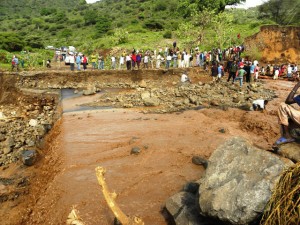Compiled by Valerie Leach
The main preoccupation of consumers in Tanzania has been the continued rise in the cost of living, caused by higher food and energy prices and exacerbated by the falling value of the Tanzanian shilling.
As illustrated in the graph in TA Issue 100, the Consumer Price Index has risen significantly over the last year. Overall, the consumer price index in October was 17.9% higher than it had been a year earlier. Food prices have continued their sharp rise. The National Bureau of Statistics reported that the prices of food and non-alcoholic beverages rose by 22.8% for the year ending October 2011. Fuel prices have also risen sharply – by 37.4% in the same period. The increasing prices of food and energy contrast with relatively stable prices of other items in the consumer price index (www.nbs.go.tz).
The exchange rate has been volatile. In mid-November 2011 the Tanzanian Shilling was around TShs 1,650 to the US $ and TShs 2,600 to the UK £ (Bank of Tanzania). Earlier in the month, it had depreciated to TShs 1,840 a dollar. The BoT Governor, Prof Benno Ndulu, announced measures to curb inflation and shilling depreciation that include tightening monetary policy, stemming volatility in the foreign exchange markets and curbing currency speculation. Some economists have faulted this stance, saying that these are simply short term measures and that the factors behind galloping inflation and shilling depreciation are more structural than monetary (Daily News).
Monetary and fiscal policies
The International Monetary Fund (IMF) said sub-Saharan countries’ monetary policies need to firmly focus on bringing non-food inflation back into single digits and sustaining it there to prevent inflationary expectations from becoming entrenched. “A tighter fiscal stance would also facilitate monetary authorities’ task of getting inflation under control,” IMF said in its June Regional Outlook released in October (Daily News).
The need for a tighter fiscal stance in Tanzania was highlighted by Peter Allum, division chief at the IMF African Department at the conclusion of the IMF’s latest Policy Support Instrument (PSI) review early in November. He warned that Tanzania’s overall recurrent spending had out-paced revenues and grant financing, contributing to growing fiscal deficits and a rising public debt stock. “It was agreed that the budget deficit in 2011/12 should be allowed to exceed the earlier programmed level of 6% of GDP to help finance the emergency power plan and accommodate expanded social spending,” said Allum. Savings in non-priority programmes were expected to reduce the budget deficit to around 6.5% of GDP by the end of June next year, and help tackle inflation, he said (Reuters and The Guardian).
Government Liquidity Problems?
Signs were reported that State coffers are running dry. Reliable sources have confided to The Citizen that in October a number of government workers in some district councils failed to get their pay in time, while some received partial payment. But Minister for Finance and Economic Affairs Mustafa Mkulo quickly dismissed the concern and maintained that the government was in a sound financial position and capable of meeting its financial obligations without any unnecessary delays. A source that asked not to be named at the Finance ministry said Geita was one of many councils whose workers either received their pay late or received less than what was due to them. The source also said the government had also failed to release funds for other charges (OC) for the second quarter of this financial year. According to the Finance Act, OCs for the second quarter are supposed to be released on October 1 (The Citizen).
Tanzania’s growth may top 6% this year
Tanzania’s growth this year may exceed the 6% forecast earlier due to the strong performance of its telecommunications, construction and financial services sectors, the IMF has said. The IMF cut this year’s growth forecast for the country to 6% from 7.2% in March, saying frequent power outages would hurt output. while food and fuel prices could push inflation higher. Tanzania’s economy grew by 6.3% in the first half of 2011 (Reuters and the Guardian).
Waiver of embargo on export of food crops
In mid-November, amid signs that there was no critical national shortage of food, it was announced that the government will soon waive the business embargo previously imposed on export of foodstuffs. Deputy Minister for the East African Community Dr Abdallah Sadalah revealed that the government would soon allow food transportation ahead of the embargo expiry towards the end of this year. Dr Sadalah said after signs of relief against the hunger threat the government was now looking at some possibilities to allow cross border food trade, especially to countries like Sudan and Somalia which were suffering from a severe food crisis. This follows President Kikwete’s mid-October directive that government institutions allow local traders to export surplus food to neighbouring countries, without causing any shortage. He also sanctioned selling of food to the United Nations World Food Programme (WFP), saying however, the country should remain with enough stocks. The President also urged government institutions to ensure surplus food in some regions is transported to urban areas to contain soaring prices and enable the poor to get food at affordable prices (Daily News).
But transport problems continue…

Youths in Dar es Salaam ferry passengers across Kigogo Road for TShs 500 per person. The area has become a nightmare for motorists and pedestrians, forcing commuter buses to suspend services along the route. (Photo by Fadhili Akida)

Section of the Arusha-Karatu road washed away by flash floods and landslides near Mto wa Mbu in November, causing communication routes to the Ngorongoro and Serengeti areas to be cut. (Picture Prisca Libaga - Maelezo)
Investment and technology
More promising news on economic development came from Kigoma, where Tanzania is about to have its own first ever copper smelter following an agreement between the Kigoma Regional Administration and an international firm, City Energy & Infrastructure, which has signed a Memorandum of Understanding committing itself to undertake a number of projects in the Region worth $500 million (about TShs 850 billion). Technicians are assembling a new power plant in Kigoma which is expected to make power shortage in the region a thing of the past (The Citizen).
Jatropha was in the news again. The Jatropha plant, which was previously avoided due to fear that it threatened food production, has reportedly gained popularity among smallholder farmers due to good prices offered in the market. Programme manager with Faida Market Link organisation, Thomas Silayo, said that over 19,000 smallholder farmers in central and northern Tanzania have started benefiting from the plant (The Guardian).
Telecentres – The government plans to build about 3,000 telecentres in underserved areas in a bid to narrow down the digital gap existing between urban and rural areas. At the telecentres the community will be able to access information through television and ICT tools such as the internet, fax and telephones.
Land – During the royal visit to Tanzania, pastoralists told Prince Charles and his wife Camilla that the current land tenure system was marginalising them. They also complained that foreigners were acquiring huge tracts of land in many areas for cultivating biofuel plants and for carving out conservation programmes at the expense of the indigenous people who were left landless (The Citizen).
